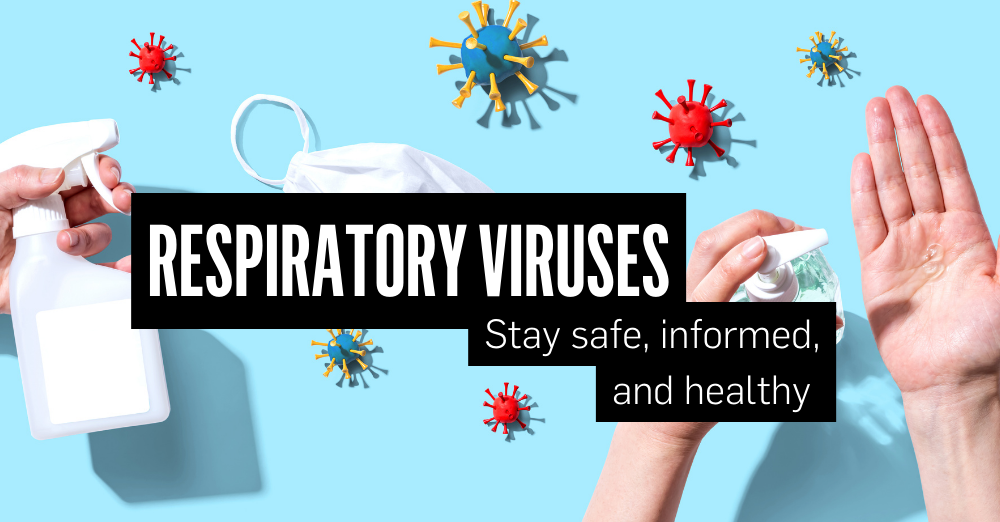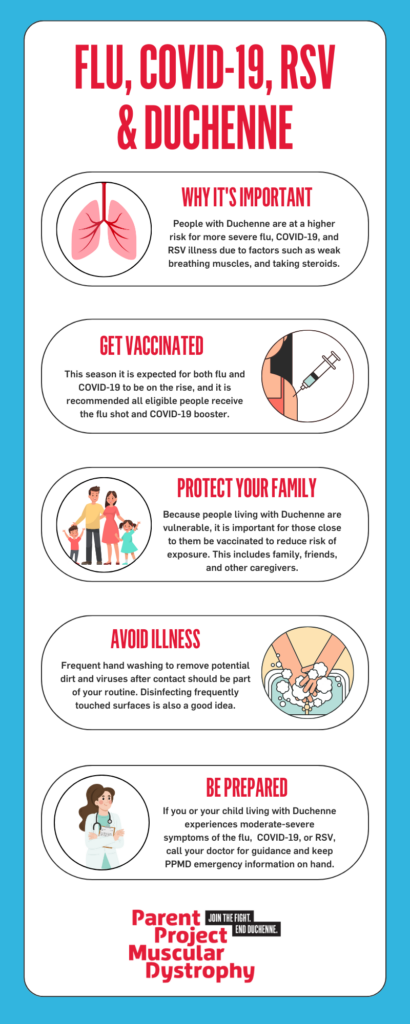
As school has started and the winter season approaches, the increase in respiratory viruses is soon to come. This year it’s important to protect yourself, your children and your family from all respiratory viruses, but especially some of the more serious ones – including influenza (flu), RSV, and COVID. Individuals living with Duchenne and Becker muscular dystrophy are at a higher risk of respiratory complications secondary to respiratory infection.
There a few things you need to know about these viruses and how to keep you and your loved ones protected:
- Get vaccinated – vaccinations for influenza and COVID-19 are the best way to prevent infections from these viruses. While it cannot be 100% guaranteed, vaccination has been proven to result in fewer cases of influenza & COVID-19 and milder, shorter illness for those who do become infected with these viruses.
- Discuss your eligibility for vaccinations with your neuromuscular doctor and/or primary care provider
- Read more about CDC recommendations for the flu vaccine and COVID-19 vaccines or ask your healthcare provider for more information
- Protect your family – Because people living with Duchenne are vulnerable, it is important for those close to them to be vaccinated to reduce risk of exposure. This includes family, friends and other caregivers
-
- Vaccinating family members can reduce your risk of becoming ill, even if you are not vaccinated yourself. While not broadly available, vaccination against RSV for those two years of age or less, or 60 years or older, is now available.
-
- Avoid illness – Good hand hygiene is the number 1 way to prevent illness from spreading. Wipe down high-touch surfaces such as wheelchairs, table tops, desks, phones, tablets, and more. Droplets containing germs can live on these surfaces and can put individuals at risk of infection
- Avoid others who are sick – If you are able to avoid others who are sick, it can decrease the risk of viruses spreading to you and/or your family.If you are unable to avoid others who are sick, or are sick yourself, consider wearing a mask to decrease the risk of infection spread.
When to seek medical care
Because flu, COVID-19 and RSV have similar symptoms, it is important to seek medical care if you suspect you or your child has an infection.
See this comparison chart from Children’s Hospital Los Angeles:
COVID vs. Flu vs. RSV vs. Common Cold comparison chart
Be sure to contact your primary care provider and/or neuromuscular team directly for medical advice. If you are worried about your child, do not wait to call. You can find a list of CDCC emergency numbers here. It’s also important to be familiar with the Duchenne and Becker Emergency Care Guidelines, including oxygen precautions. Be sure to share this information with medical providers if they are unfamiliar with Duchenne or Becker.
*If your child is having trouble breathing, is lethargic, has blue lips or fingernails, call 911 as this is an emergency.
How to manage my child’s pulmonary care when sick
Managing you/your child’s pulmonary care while sick is critically important. Watch PPMD’s recent webinar with pulmonary experts from our Certified Duchenne Care Centers on how to identify and manage you/your child’s respiratory symptoms during the winter months.
Watch: Pulmonary Management in Winter Season
Don’t forget to keep PPMD’s Safe and Unsafe Medication List on hand.



 by: Parent Project Muscular Dystrophy
by: Parent Project Muscular Dystrophy


